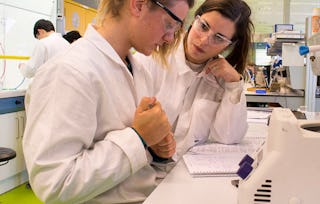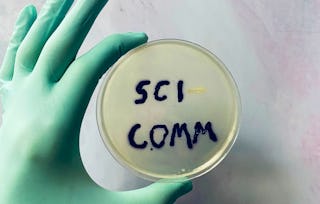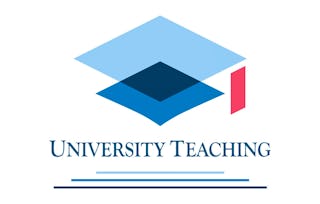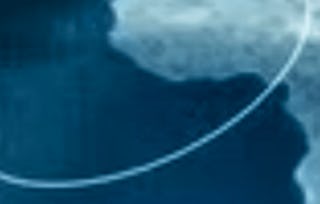This course will prepare you for teaching science in higher education. In this MOOC you will learn to make your knowledge as an excellent researcher accessible to your students. We will show you how to communicate science to novices as well as advanced students in science. You will experience the value of teaching with analogies and you will be guided to train your students' competences. Based on up-to-date findings from research into teaching and learning science you will be able to

Teaching Science at University

196 reviews
Skills you'll gain
Details to know

Add to your LinkedIn profile
See how employees at top companies are mastering in-demand skills

There are 5 modules in this course
Welcome to your first week of Teaching Science at University! In this first module we will give you an overview of what you will learn during our 5-week course and show you what you can achieve as an excellent lecturer or teaching assistant at your university! In the first lesson our focus is on evidence-based teaching. We will show you how you can base your lectures, lab classes, and courses on science education research. You will learn about main principles of visible learning and mind frames which will help you to embrace these principles. Then we will adapt learning theories to science teaching, starting with behaviorism up to cognitivism, constructivism, and neurodidactics. Interviews with a Professor in Animal Behaviour and a Professor in Neuroscience give further insight in the way we learn. At the end of the first week, you should be able to implement and reflect upon one evidence-based teaching strategy in your own teaching. Have fun!
What's included
7 videos7 readings1 peer review
Understanding scientific concepts is the core of learning science, but often our pre-instructional conceptions act as barriers to reach an appropriate understanding. In this module we will show how to guide students from their everyday conceptions to scientific ones. You will learn how to use your students’ pre-conceptions not as obstacles but as starting points for teaching science. We will show you some methods for a quick assessment of your students’ conceptions. We look at strategies how we can change our students’ conceptions and how we can help your students to change their ideas. Finally we consider how you as a teacher can foster student engagement in class. At the end of the second week you should be able to address the pre- instructional conceptions of your students in your teaching.
What's included
6 videos2 readings1 peer review
This week we would like to show how invisible concepts become visible. In everyday life we learn so many things by comparing and contrasting. From research we know that the use of analogies and metaphors are important features in the scientific endeavor, and their use in teaching science seems a natural extension. We raise the question whether analogies are just excellent communication tools or if they can generate new knowledge. What do the majority of students really understand when analogies are used to explain abstract and difficult ideas such as molecular structures, diffusion, and plate tectonics? We show that It is important to consider students’ personal constructions since no student enters the lecture hall as “tabula rasa.” Science classrooms are common settings in which analogies are used to enhance concept learning; therefore, improving the way analogies are used in science education has important teaching and learning consequences. At the end of the third week you should be able to choose good analogies for teaching science and implement them fruitfully.
What's included
5 videos4 readings1 peer review
This week we want to show you how we can frame our science teaching to increase interest, motivation, and understanding of the students. In the first lesson we ask how the framing of science teaching can help students see the relevance of science for society. We look at problems from everyday life and their potential to foster students understanding of science. Activating our students is one key to reducing failure rates in our classrooms. We look how to design a new course by setting the goals our students have to achieve and how to foster learning when supervising a thesis. Finally we look how to communicate risk and uncertainty in an appropriate way to foster understanding. At the end of this week you should be able to frame your science teaching to make it relevant for your students.
What's included
7 videos4 readings1 peer review
This week we focus on improving students’ learning in a lab or in the field. In the first lesson we show you how to design a lab class, then we focus on delivering a lab class. We show you how you can use design principles (known as “gestalt principles”) to present experiments in a manner which is easy for your students to understand. Then we look at a model on students’ competences on experimentation that you can use to track the development of your students’ conceptual development. From research we know that students often hold inadequate conceptions about the nature of science and the scientific endeavor. We show you how you can address these conceptions to enable your students to understand the meaning of experiments, models, and theories in science. Finally we focus on the role of models in science education. We look at a model for model competence you can use to analyse where your students stand and to train different dimensions of dealing with models. At the end of this week you should be able to design a lab class that improves the inquiry skills of your students.
What's included
8 videos4 readings1 peer review
Instructors


Offered by
Explore more from Personal Development
 Status: Preview
Status: PreviewUniversity of Amsterdam
 Status: Preview
Status: PreviewUniversity of Colorado Boulder
 Status: Preview
Status: PreviewThe University of Hong Kong
 Status: Preview
Status: PreviewInstitut Mines-Télécom
Why people choose Coursera for their career

Felipe M.

Jennifer J.

Larry W.

Chaitanya A.
Learner reviews
- 5 stars
74.11%
- 4 stars
18.78%
- 3 stars
4.06%
- 2 stars
0.50%
- 1 star
2.53%
Showing 3 of 196
Reviewed on Jul 23, 2021
The course was resourcefull and inspiring with relevant material and good planning structure
Reviewed on Jun 23, 2020
This course is very informative and is really relevant for improving Science education. Worthy of time and effort.
Reviewed on Nov 5, 2023
This course is very very information and it help me that in what ways I will convey science concepts to the students. Great experience. Thanks

Open new doors with Coursera Plus
Unlimited access to 10,000+ world-class courses, hands-on projects, and job-ready certificate programs - all included in your subscription
Advance your career with an online degree
Earn a degree from world-class universities - 100% online
Join over 3,400 global companies that choose Coursera for Business
Upskill your employees to excel in the digital economy
Frequently asked questions
The course consists of lectures and assignments at the end of each week. The assignment is designed to let you implement the week's course content into your own teaching syllabus, for example when developing an analogy for your own course. By developing the assignments and giving feedback to others' assignments you can collect points to complete the course.
The course is designed as a professional development course for people teaching in science contexts. For example PhD students often need to collect credit points in their programs. Unfortunately we cannot give credits. But universities often "translate" the course certificate into credits for your programs. Just ask your supervisors/program leaders.
To access the course materials, assignments and to earn a Certificate, you will need to purchase the Certificate experience when you enroll in a course. You can try a Free Trial instead, or apply for Financial Aid. The course may offer 'Full Course, No Certificate' instead. This option lets you see all course materials, submit required assessments, and get a final grade. This also means that you will not be able to purchase a Certificate experience.
More questions
Financial aid available,
¹ Some assignments in this course are AI-graded. For these assignments, your data will be used in accordance with Coursera's Privacy Notice.

